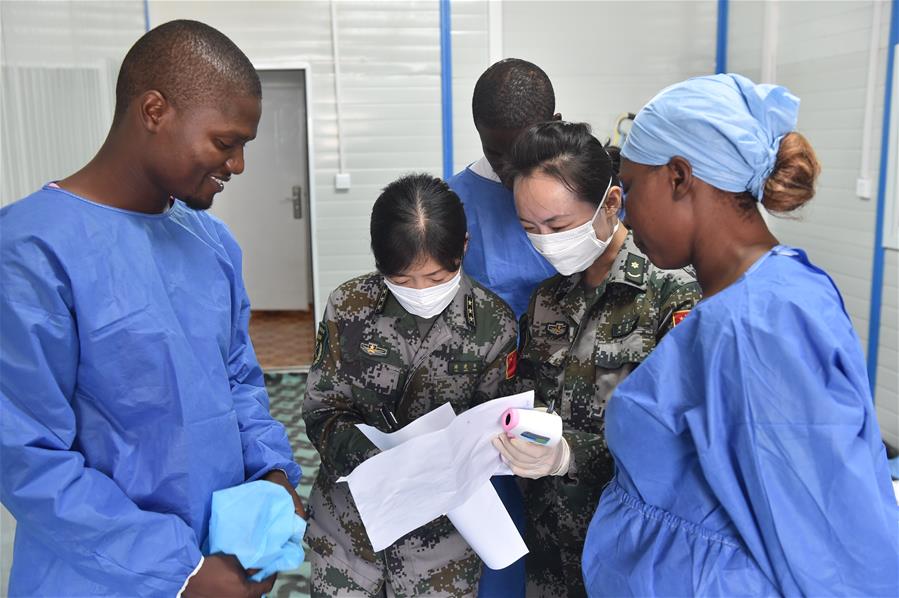Chinese medical services boost healthcare in Africa
Since the first Chinese medical team arrived in Africa in 1963, all kinds of non-profitable Chinese medical services have contributed to the continent's healthcare and saved the lives of tens of thousands of people.
Since the first Chinese medical team arrived in Africa in 1963, all kinds of non-profitable Chinese medical services have contributed to the continent's healthcare and saved the lives of tens of thousands of people.
Local medical staff receive training from Chinese doctors on Ebola treatment in Monrovia, Liberia, Dec. 3, 2014. [Photo/Xinhua]
In recent years, cooperation in healthcare between China and Africa has witnessed tremendous results, helping to forge close ties between the two.
Decades of help
Through decades of medical cooperation and exchanges, China has exerted all means to assist Africa, including building medical institutions, providing medicines and medical devices, organizing training sessions, and offering scholarships to African medical talents.
From Addis Ababa in Ethiopia to Windhoek in Namibia, 43 Chinese medical teams are working round the clock providing services across Africa.
China has sent over 20,000 medical workers to Africa since 1963 and some 200 million African people have benefited as a result.
When the outbreak of Ebola virus disease picked up pace in West Africa in 2014, China sent over teams with no hesitation.
In February 2014, an Ebola epidemic broke out in Guinea and later spread to Sierra Leone and Liberia, while other countries also reported infection cases. The outbreak claimed hundreds of lives in months and posed a great threat to the affected countries.
Since the outbreak, China has carried out its largest aid program in the area of health, providing several rounds of financial aid to Africa, sending hundreds of medical personnel and public health experts to the affected countries and training local medical workers.
"China has always stood with Liberia as a true friend," then Liberian President Sirleaf said, noting China's assistance and contributions to her country's fight against the Ebola disease has been well noted.
According to Chinese Ambassador to Tanzania Wang Ke, medical and health cooperation between the two countries began in 1960s when the Chinese government started sending medical teams to Zanzibar and the Tanzania mainland.
A friend in need
"A friend in need is a friend indeed, and for that reason, China has truly proven to be our friend indeed through its support in different sectors in this country," said Tanzanian Minister for Education, Science and Technology Joyce Ndalichako in Dar es Salaam earlier this month when bidding farewell to the students and medical staff who are going to China to study on Chinese scholarships.
"We are glad and appreciate that most of these trainees will be trained in the areas where the nation is facing a critical shortage of staff," Ndalichako said.
When Chinese navy hospital ship "Peace Ark" visited Tanzania in November last year and provided free medical treatment to the locals, Tanzanian President John Magufuli thanked Chinese doctors.
"The coming of the ship has written a new history in the cordial relationship of the two countries," he said.
The "Peace Ark" had stayed eight days in Tanzania's commercial capital Dar es Salaam and treated 6,441 patients.
In Ethiopia, Chinese medical teams have more than nearly 45 years of experience working across the country.
Mei Gengnian, head of the first Chinese medical team to Ethiopia, died in 1975 in a car accident while he was serving local communities in Jimma, 380 km south of Addis Ababa.
Buried near the spot where he died, his grave is being tended by a local family, and Mei's son has followed his father's footsteps by joining a mission to Ethiopia.
At a ceremony held in Lusaka this month to celebrate 40 years of the presence of Chinese medical teams in Zambia, the country's Minister of Health Chitalu Chilufya said, "We want to place on record our gratitude to the people of China and the Chinese government for this great cooperation."
Strengthened ties
At a ministerial conference in South Africa last year, China called for intensified efforts to improve the accessibility healthcare services in Africa and scale up support for the health needs of the young people and women.
In 2015, the summit of the Forum on China-Africa Cooperation in Johannesburg listed public healthcare cooperation as part of the 10 China-Africa cooperation plans, lifting China-Africa healthcare ties to a new level.
China and Africa have seen deepened cooperation in the healthcare sector. For example, the Brightness Action campaign, a China-led activity for patients with eye illnesses, has witnessed achievements.
In the Republic of Congo, the Brightness Action campaign was launched in 2016 with Chinese medical team stationed at the China-Congo Friendship Hospital (CCFH), which has received modern surgical supplies and medical instruments from China in recent years.
Zhang Weipeng, an ophthalmologist at the CCFH and also the doctor in charge of cataract surgery, said his department receives an average of 30 patients every day and many of them come here specially for phacoemulsification.
The doctor said some local patients are reluctant to seek treatment until their eyesight is blurred by cataracts, making it more difficult for the surgery to be performed.
Actively involved in training sessions for local people to increase public awareness of eye illnesses and for medical personal to promote their skills, Zhang said his commitment is to "teach a man to fish."
He said only when local doctors can independently perform cataract surgeries can there be a permanent medical team to provide the service to the public.
Zhang said his "biggest joy" is seeing patients regain their eyesight. "It moves me a lot to see that Congolese patients trust Chinese doctors."


